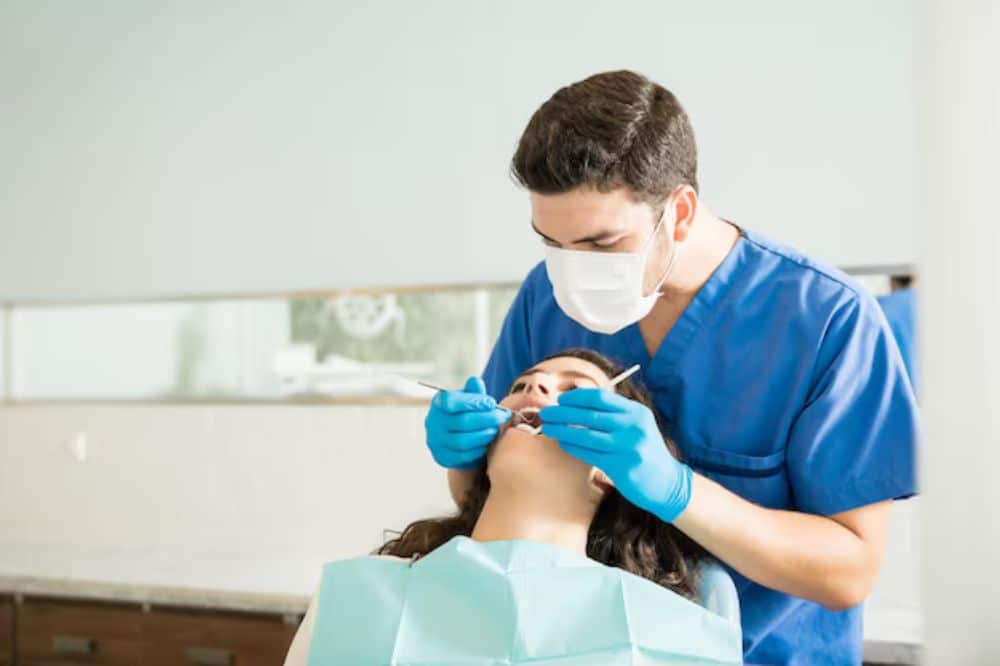Healing Beyond the Smile
Facial or jaw trauma can have a lasting impact on more than appearance. Injuries to the jaw can affect how a person eats, speaks, and even breathes. Whether caused by an accident, sports injury, or surgical procedure, trauma to the jaw requires specialized care to restore comfort, function, and confidence.
At Aria Dental Studio, we understand how essential full jaw function is to everyday life. As your trusted Downtown Dentist Vancouver, our team provides personalized, restorative care that helps patients recover mobility, comfort, and strength after traumatic injury. Through advanced techniques and compassionate treatment, dentistry plays a key role in both healing and long-term recovery.
Understanding Jaw Trauma
The jaw is one of the most complex and powerful structures in the body. It consists of the upper and lower jaws, the temporomandibular joints, and the muscles that control movement. Trauma to this area can affect the way these parts work together, leading to pain, misalignment, and difficulty performing simple daily actions such as chewing or smiling.
Common causes of jaw trauma include:
- Motor vehicle accidents
- Sports injuries
- Falls or impacts to the face
- Surgical complications
- Tooth or bone fractures
The severity of jaw trauma can range from mild discomfort to fractures or dislocations that require comprehensive rehabilitation.
How Dental Professionals Support Recovery
While treatment for jaw trauma often involves a multidisciplinary team, dental professionals play a central role in restoring oral function and stability. At Aria Dental Studio, our focus is on rebuilding both the health and harmony of the jaw through restorative and rehabilitative dental care.
Step One: Assessment and Diagnosis
Effective recovery begins with a detailed assessment. Your Vancouver Dentist will conduct a comprehensive examination using digital imaging and diagnostic tools to identify the extent of damage to teeth, bone, and surrounding tissues.
This evaluation helps determine whether the trauma has caused misalignment, muscle strain, or joint issues. From there, a customized treatment plan is created to restore proper bite function and symmetry.
Step Two: Stabilization and Pain Management
In the early stages of recovery, stabilizing the jaw and managing pain are the top priorities. Depending on the nature of the injury, your dentist may:
- Apply temporary splints or bite guards to support healing
- Recommend soft tissue therapies to reduce inflammation
- Coordinate with specialists such as oral surgeons or physiotherapists if needed
Proper stabilization allows the muscles and joints to heal in correct alignment, preventing long-term complications such as chronic jaw pain or difficulty opening and closing the mouth.
Step Three: Restorative Dental Treatments
Once initial healing has taken place, restorative dental care helps rebuild structure and function. Depending on the extent of damage, treatment may include:
1. Dental Implants or Bridges
If trauma has resulted in tooth loss, implants or bridges can replace missing teeth while maintaining proper bite alignment. Dental implants also help preserve jawbone integrity by stimulating bone growth where natural roots are missing.
2. Crowns and Restorations
Damaged teeth can be restored with crowns, onlays, or composite bonding to restore strength and function. These restorations also help distribute bite pressure evenly, supporting the healing jaw.
3. Orthodontic Adjustments
If trauma has caused misalignment or uneven bite patterns, orthodontic care may be recommended to guide teeth back into balance. Correct alignment supports jaw mobility and reduces tension on the joints.
4. Occlusal Equilibration
This procedure involves adjusting the bite to ensure even contact between upper and lower teeth. It helps relieve muscle strain and improves overall comfort when chewing or speaking.
Step Four: Rehabilitation and Functional Recovery
As healing progresses, jaw rehabilitation focuses on improving mobility, flexibility, and muscle coordination. This stage may include:
- Jaw exercises to strengthen muscles and restore range of motion
- Bite correction therapies to prevent uneven stress on the jaw joints
- Custom splints or nightguards to protect against clenching or grinding during recovery
These treatments are designed to restore natural function while preventing future complications. Regular follow-ups ensure that healing stays on track and that adjustments can be made as needed.
Managing Temporomandibular Joint (TMJ) Disorders After Trauma
Jaw trauma can sometimes lead to temporomandibular joint dysfunction, commonly known as TMJ disorder. Symptoms may include:
- Clicking or popping sounds when opening the mouth
- Pain in the jaw or around the ears
- Difficulty chewing or locking of the jaw
Your Downtown Dentist Vancouver can provide therapies to manage TMJ discomfort, including bite splints, physiotherapy, and gentle exercises to relax the surrounding muscles. Early intervention can prevent these symptoms from becoming chronic.
Nutrition and Lifestyle During Recovery
Nutrition plays an important role in the healing process. Patients recovering from jaw trauma should focus on soft, nutrient-rich foods that are easy to chew and do not strain the jaw muscles. Smooth soups, yogurt, scrambled eggs, and cooked vegetables are ideal options.
Hydration is equally essential. Drinking water supports healing and keeps the oral tissues healthy. Avoiding hard, crunchy, or sticky foods helps protect restorative work and reduces the risk of re-injury.
Stress management is another key component. Jaw clenching often worsens after trauma, so relaxation techniques such as deep breathing or gentle stretching can help reduce muscle tension and improve recovery outcomes.
Long-Term Maintenance and Preventive Care
Recovery from jaw trauma does not end when treatment is complete. Long-term maintenance ensures that the jaw remains strong, flexible, and pain-free.
Patients are encouraged to:
- Continue regular dental checkups for monitoring
- Use nightguards if clenching persists
- Maintain consistent oral hygiene to support overall health
- Schedule professional cleanings to prevent secondary issues, such as gum inflammation
At Aria Dental Studio, we provide ongoing care and education to help every patient feel confident and supported throughout their recovery journey.
Emotional and Psychological Support
Facial trauma can be emotionally challenging. Rebuilding confidence often goes hand in hand with physical recovery. Our compassionate team understands that restoring function is not just about the mechanics of the jaw but also about restoring a patient’s sense of normalcy and comfort.
We take time to listen, address concerns, and ensure every patient feels comfortable and empowered during their treatment process.
Why Choose Aria Dental Studio for Jaw Rehabilitation
At Aria Dental Studio, we combine advanced technology with a personalized approach to care. Our experienced dental team uses precision diagnostics and modern restorative techniques to support patients recovering from jaw injuries.
From initial evaluation to long-term maintenance, our focus is on restoring full function, relieving discomfort, and helping patients regain confidence in their smile.
If you have experienced jaw trauma or ongoing discomfort following an injury, our team can help you recover both comfort and stability.
Restore Strength and Comfort with Expert Care
Jaw trauma can affect every aspect of daily life, but with the right dental care, full recovery is possible. Modern restorative and rehabilitative dentistry offers solutions that rebuild strength, comfort, and confidence.
Schedule a consultation with Aria Dental Studio, your trusted Vancouver Dentist. Our team will provide a detailed assessment and create a customized plan to help you restore balance, improve function, and achieve a healthy, lasting smile.
Whether you are searching for a Downtown Dentist in Vancouver or a long-term partner in oral health, our team is here to support your recovery every step of the way.


